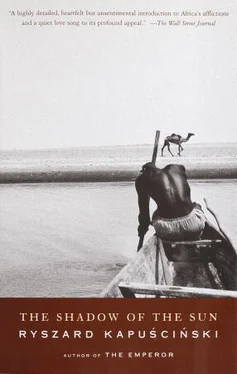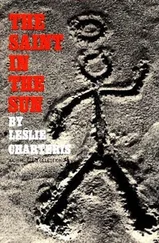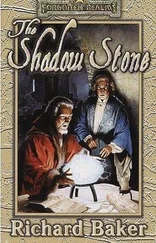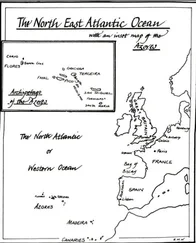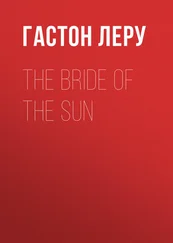A good example of this deifying metamorphosis might be the record of Leshina. She was a Zambian woman, around forty, a street merchant in the little town of Serenge. She did not distinguish herself in any particular way. These were the 1960s, and in various corners of the world one still came upon hand-cranked phonographs. Leshina had such a phonograph, and one completely worn and scratched-up record. It was a recording of Churchill’s 1940 speech, in which he summoned Englishmen to wartime renunciations and sacrifice. The woman set the phonograph up in her yard and cranked the handle. From the green-painted metal tube rose a low, hoarse rumbling, grunting, and gurgling, in which one could pick out some traces of an emotional, dramatic voice, though the sounds were by now incomprehensible and devoid of meaning. Leshina explained to the onlookers — and the gaping crowds kept growing in number — that this was God’s voice anointing her his emissary and commanding absolute obeisance. More and more gathered around her. Her followers, for the most part poor people without a penny to their names, with superhuman effort raised a temple to her in the bush and began conducting prayers there. At the start of each mass, Churchill’s booming bass worked them up into an ecstatic trance. But African leaders are ashamed of such religious cults, and President Kenneth Kaunda sent out the army against Leshina. Several hundred innocent people were murdered, and tanks reduced the clay temple to dust.
The European in Africa sees only part of it, usually only the continent’s exterior coating, the frequently not very interesting, and perhaps least important, part of it. His vision glides over the surface, penetrating no deeper and refusing to imagine that behind every thing a mystery may be hidden, and within as well. But European culture has ill prepared us for these excursions into the depths, into the springs of other worlds and other cultures — or of our own, for that matter. For historically, it was a fact of the drama of cultures that the first contacts between them were most frequently carried out by the worst sorts of people: robbers, soldiers of fortune, adventurers, criminals, slave traders, etc. There were, occasionally, others — good-hearted missionaries, enthusiastic travelers and explorers — but the tone, the standard, the atmosphere were for centuries set and sustained by a motley and rapacious international riffraff. Naturally, respect for other cultures, the desire to learn about them, to find a common language, were the furthest things from the minds of such folk, for the most part benighted, dull-witted mercenaries, lacking refinement and sensitivity, often illiterate, interested only in conquest, plunder, and carnage. As a result of such encounters, the world’s cultures — instead of becoming versed in one another’s ways, drawing closer, permeating one another — became mutually hostile or, at best, indifferent. Their representatives, aside from the rogues, kept their distance, avoided and even feared one another — intercultural exchange was monopolized by a class of ignoramuses. As one consequence, interpersonal contacts were informed from the outset by the most primitive criterion: skin color. Thus racism became an ideology according to which people defined their place in the world. Whites-Blacks: a division that bred discomfort on both sides. In 1894, when the Englishman Frederick Lugard was advancing at the head of a small division deep into western Africa, with the aim of conquering the kingdom of Borgu, he demanded to meet the king. But a messenger arrived to announce that the ruler could not receive him. As he spoke with Lugard, the envoy kept spitting into a bamboo container hanging around his neck. Spitting, it turned out, was deemed protection and purification from the consequences of contact with a white man.
Racism, hatred and contempt for others, and the desire to exterminate them, have their roots in African colonial relations. Everything was invented and honed there centuries before totalitarian systems grafted those grim and disgraceful impulses onto twentieth-century Europe.
The cultural monopoly of crude know-nothings had a further consequence: European languages did not develop vocabularies adequate to describe non-European worlds. Entire areas of African life remain unfathomed, untouched even, because of a certain European linguistic poverty. How do we describe the dark, green, dank interior of the jungle? Those hundreds of trees and shrubs — what are they called? I know names like “palm,” “baobab,” “euphorbia,” but they happen not to grow in the jungle. And those enormous, ten-meter-high trees in Ubangi and Ituri — what are they called? What about the countless species of insects, which are everywhere continually attacking and biting us? Sometimes one can find a Latin name, but how might that help the average reader? And these are mostly the problems of botany and zoology. What of the immense realm of the psychology, faith, and mentality of Africans? The richness of every European language is a richness in ability to describe its own culture, represent its own world. When it ventures to do the same for another culture, however, it betrays its limitations, underdevelopment, semantic weakness.
Africa is a thousand situations, varied, distinct, even contradictory. Someone will say, “There is war there,” and he will be right. Someone else, “It is peaceful there,” and he too will be correct. Because everything depends on where and when.
During precolonial times, and hence not so long ago, more than ten thousand little states, kingdoms, ethnic unions, and federations existed in Africa. Roland Oliver, a historian at the University of London, draws attention to a general paradox in his book, The African Experience (1991): it has become common parlance to say that European colonialists partitioned Africa. Partitioned? Oliver marvels. Colonialism was a brutal unification, brought about by fire and sword! Ten thousand entities were reduced to fifty.
But much of the underlying variety, this mosaic — this shimmering collage of pebbles, bones, shells, bits of wood, pieces of tin, and leaves — has remained. The more closely we stare at it, the better we see how the bits and pieces of this tableau change place, shape, and hue, giving rise to a spectacle staggering in its mutability, richness, pulse of color.
Several years ago I was spending Christmas Eve with friends in the Mikumi National Park, deep in Tanzania. The evening was warm, clear, windless. In a clearing in the bush, under the open sky, stood several tables piled high with fried fish, rice, tomatoes, local pombe beer. Candles, lanterns, and oil lamps were burning. The atmosphere was jovial, easy. There were jokes, laughter, and much storytelling, as is always the case in Africa on such occasions. In attendance were Tanzanian government ministers, ambassadors, generals, clan chiefs. Midnight passed. Suddenly, I sensed in the impenetrable darkness, which began immediately beyond the illumination of the tables, a rocking and thundering. The din intensified rapidly, and then, just at our backs, from the depths of the night, an elephant emerged. It is one thing to find yourself eye to eye with an elephant in a zoo or a circus — quite another in the African bush, where the elephant is the formidable lord of his world. The lone elephant, apart from the herd, is often an animal running amok, a frenzied predator that attacks villages, tramples mud houses, kills people and cattle.
This one was truly immense, his glance gimletlike, strangely piercing. And he was silent. We could not tell what was going on in his gigantic head, what he would do a second from now. He stood for a while, and then began to stroll among the tables. Everyone was dead silent, frozen with fear, paralyzed. You cannot move — for what if that should trigger his fury? And he is fast: you cannot run away from an elephant. Sitting motionless, on the other hand, you expose yourself to a full frontal attack, and might die crushed under the giant’s legs.
Читать дальше
